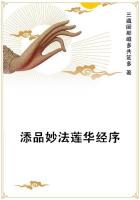Rake's Progress Many toasts were uproariously honored, the health of each member of the party in turn, then the country of each: France and England first, out of courtesy to the ladies, Italy next, since this beautiful and extraordinary meeting of distinguished people (as Mellin remarked in a short speech he felt called upon to make) took place in that wonderful land, then the United States. This last toast the gentlemen felt it necessary to honor by standing in their chairs.
[~Song: The Star-Spangled Banner--without words--by Mr. Cooley and chorus.~]
When the cigars were brought, the ladies graciously remained, adding tiny spirals of smoke from their cigarettes to the layers of blue haze which soon overhung the table. Through this haze, in the gentle light (which seemed to grow softer and softer) Mellin saw the face of Helene de Vaurigard, luminous as an angel's. She ~was~ an angel--and the others were gods. What could be more appropriate in Rome? Lady Mount-Rhyswicke was Juno, but more beautiful. For himself, he felt like a god too, Olympic in serenity.
He longed for mysterious dangers. How debonair he would stroll among them! He wished to explore the unknown; felt the need of a splendid adventure, and had a happy premonition that one was coming nearer and nearer. He favored himself with a hopeful vision of the apartment on fire, Robert Russ Mellin smiling negligently among the flames and Madame de Vaurigard kneeling before him in adoration.
Immersed in delight, he puffed his cigar and let his eyes rest dreamily upon the face of Helene. He was quite undisturbed by an argument, more a commotion than a debate, between Mr. Pedlow and young Cooley. It ended by their rising, the latter overturning a chair in his haste.
"I don't know the rudiments, don't I!" cried the boy. "You wait!
Ole Sneydie and I'II trim you down! Corni says he'll play, too.
Come on, Mellin."
"I won't go unless Helene goes," said Mellin. "What are you going to do when you get there?""Alas, my frien'!" exclaimed Madame de Vaurigard, rising, "is it not what I tol' you? Always you are never content wizout your play.
You come to dinner an' when it is finish' you play, play, play!""~Play~?" He sprang to his feet. "Bravo! That's the very thing I've been wanting to do. I knew there was something I wanted to do, but I couldn't think what it was."Lady Mount-Rhyswicke followed the others into the salon, but Madame de Vaurigard waited just inside the doorway for Mellin.
"~High~ play!" he cried. "We must play high! I won't play any other way.--I want to play ~high~!""Ah, wicked one! What did I tell you?"He caught her hand. "And you must play too, Helene.""No, no," she laughed breathlessly.
"Then you'll watch. Promise you'll watch me. I won't let you go till you promise to watch me.""I shall adore it, my frien'!""Mellin," called Cooley from the other room. "You comin' or not?""Can't you see me?" answered Mellin hilariously, entering with Madame de Vaurigard, who was rosy with laughter. "Peculiar thing to look at a man and not see him."Candles were lit in many sconces on the walls, and the card-table had been pushed to the centre of the room, little towers of blue, white and scarlet counters arranged upon it in orderly rows like miniature castles.
"Now, then," demanded Cooley, "are the ladies goin' to play?""Never!" cried Madame de Vaurigard.
"All right," said the youth cheerfully; "you can look on. Come and sit by me for a mascot.""You'll need a mascot, my boy!" shouted Pedlow. "That's right, though; take her."He pushed a chair close to that in which Cooley had already seated himself, and Madame de Vaurigard dropped into it, laughing.
"Mellin, you set there," he continued, pushing the young man into a seat opposite Cooley. "We'll give both you young fellers a mascot." He turned to Lady Mount-Rhyswicke, who had gone to the settee by the fire. "Madge, you come and set by Mellin," he commanded jovially. "Maybe he'll forget you ain't a widow again.""I don't believe I care much about bein' anybody's mascot to-night,"she answered. There was a hint of anger in her tired monotone.
"What?" He turned from the table and walked over to the fireplace.
"I reckon I didn't understand you," he said quietly, almost gently.
"You better come, hadn't you?"
She met his inscrutable little eyes steadily. A faint redness slowly revealed itself on her powdered cheeks; then she followed him back to the table and took the place he had assigned to her at Mellin's elbow.
"I'll bank," said Pedlow, taking a chair between Cooley and the Italian, "unless somebody wants to take it off my hands. Now, what are we playing?""Pokah," responded Sneyd with mild sarca**.
"Bravo!" cried Mellin. "That's ~my~ game. Ber-~ravo!~"This was so far true: it was the only game upon which he had ever ventured money; he had played several times when the wagers were allowed to reach a limit of twenty-five cents.
"You know what I mean, I reckon," said Pedlow. "I mean what we are playin' ~fer~?""Twenty-five franc limit," responded Cooley authoritatively.
"Double for jacks. Play two hours and settle when we quit."Mellin leaned back in his chair. "You call that high?" he asked, with a sniff of contempt. "Why not double it?"The fat man hammered the table with his fist delightedly. "'He's game,' she says. 'He's the gamest little Indian ever come down the big road!' she says. Was she right? What? Maybe she wasn't!
We'll double it before very long, my boy; this'll do to start on.
There." He distributed some of the small towers of ivory counters and made a memorandum in a notebook. "There's four hundred apiece.""That all?" inquired Mellin, whereupon Mr. Pedlow uproariously repeated Madame de Vaurigard's alleged tribute.














